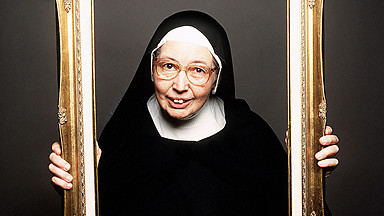"My family values" (The Guardian, May 8, 2009), an interview with Sister Wendy Beckett by Sabine Durrant:
I belong to that generation of one-parent families. For most of my childhood, my father was in the war and my mother was my predominant influence. My father came back to South Africa, a year before I left to join a convent in England. I wasn't at my best that year. I had been my mother's confidante and suddenly I was nobody. He thought I was difficult, that I wouldn't stick at being a nun. I remember him saying to my mother, "Are you sure about this, Dorothy? Isn't she rather young?" and my mother replying, "She is an odd child, Aubrey, she has wanted this since babyhood. I think we should let her." Later, he and I became extremely fond of each other.[Hat tip to JM]
As a doctor, he cured people as much by his sweetness as his physician's skill. He regarded money as something to be given away. When he died, my mother went to the bank, expecting there to be an appreciable sum, and, when she exclaimed in horror, the bank manager said, "But, Mrs Beckett, you know Aubrey was always giving money to poor people and unhappy people, you wouldn't have wanted him any different would you?" And my mother swallowed hard and said, "No, of course not."
Through my parents' example there was never any doubt in my mind that God loved us and that it mattered how we behaved. I was never aware that grown-ups quarrelled. I knew my brother and sister and I quarrelled: that was what children did. Adults I knew never spoke unkindly, were never nasty to one another. I was in for quite a shock when I entered a convent to find that I had just been very fortunate.
My mother, who always stood on the edge of things, wasn't blind to the shortcomings of other people, but they were not regarded as a subject of conversation. You might say, "Poor Mrs So and So, we must feel very sorry for her because she has an unfortunate habit of ... whatever it was." But you didn't laugh, you didn't comment.
I remember being in the car with my mother and her elder sister, Ethel, who was talking about her son's new house. She said, "You'd love to see it, wouldn't you, Wendy?" And I replied, "Well, actually, no, Auntie Ethel." And afterwards, my mother said, "Really, Wendy, that was so rude. You mustn't ever tell a lie, but there are ways of expressing an uncomfortable truth. You say, 'That house does sound lovely', which isn't committing you." I have found that very useful. So often artists send me things that I don't like so I say, "This is not quite my cup of tea, but I can see what joy you get from your art. Carry on."
When I entered the convent, another family, I was a bit taken aback. I had never fitted in at school. I didn't expect to fit in at home, but I was sure that when I got with other nuns, we would all be exactly the same, thinking of how to love God. Let's just say, I found the diversities there educated me.


No comments:
Post a Comment